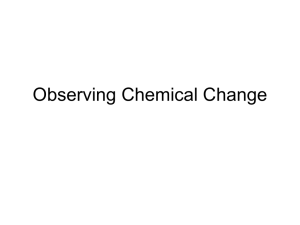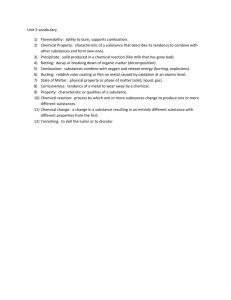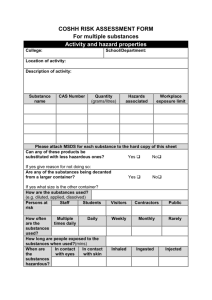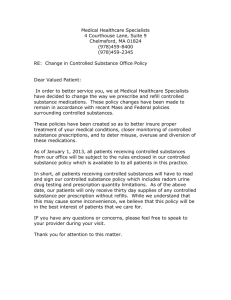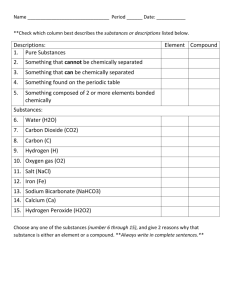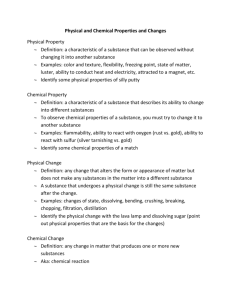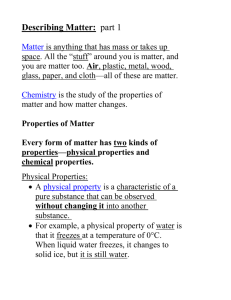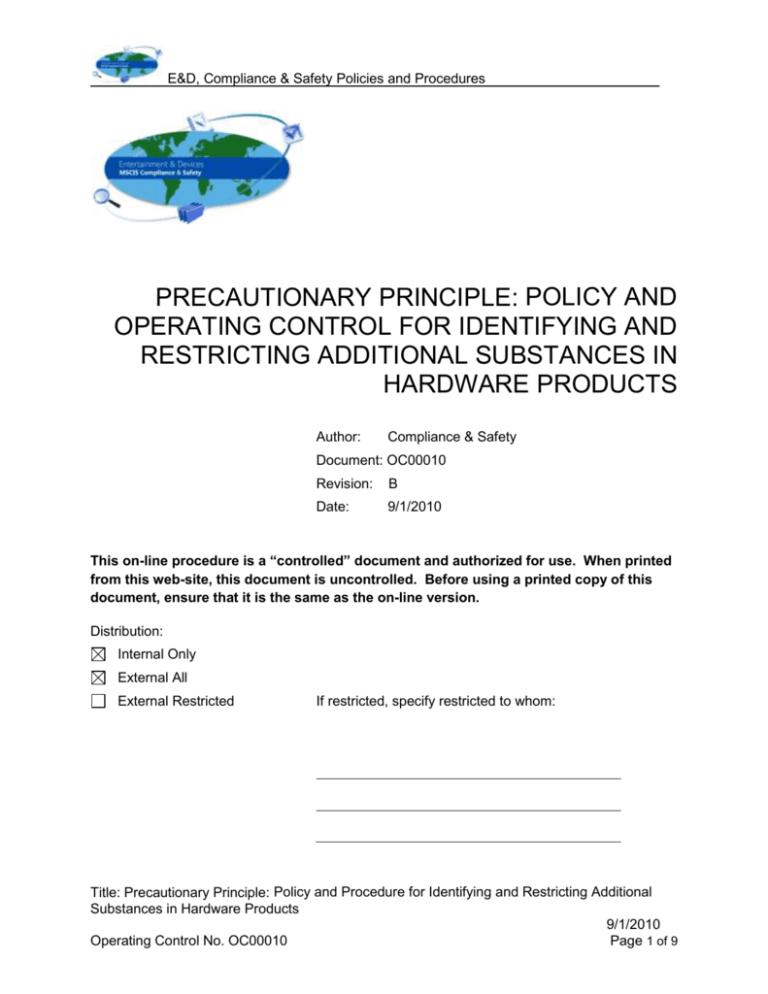
E&D, Compliance & Safety Policies and Procedures
PRECAUTIONARY PRINCIPLE: POLICY AND
OPERATING CONTROL FOR IDENTIFYING AND
RESTRICTING ADDITIONAL SUBSTANCES IN
HARDWARE PRODUCTS
Author:
Compliance & Safety
Document: OC00010
Revision:
B
Date:
9/1/2010
This on-line procedure is a “controlled” document and authorized for use. When printed
from this web-site, this document is uncontrolled. Before using a printed copy of this
document, ensure that it is the same as the on-line version.
Distribution:
Internal Only
External All
External Restricted
If restricted, specify restricted to whom:
Title: Precautionary Principle: Policy and Procedure for Identifying and Restricting Additional
Substances in Hardware Products
9/1/2010
Operating Control No. OC00010
Page 1 of 9
E&D, Compliance & Safety Policies and Procedures
This document is considered confidential to and is maintained as trade secret by Microsoft
Corporation. This document is disclosed pursuant to a non-disclosure agreement and/or other
written agreement between the recipient and Microsoft Corporation (collectively, the
“Agreement(s)”). Information in this document is restricted to Microsoft authorized recipients
only and any reproduction, distribution, or public discussion of this material is subject to the
limits described in the Agreement(s) with Microsoft Corporation.
Microsoft and its suppliers may have patents, patent applications, trademarks, copyrights, trade
secrets and/or other intellectual property rights covering subject matter in this document.
Microsoft’s furnishing of this document to recipient does not grant or imply any license to any
patents, trademarks, copyrights, trade secrets or other intellectual property rights, and
recipient’s permitted use of any such intellectual property rights, if any, is solely governed by the
Agreements.
© 2010 Microsoft Corporation. All rights reserved.
Title: Precautionary Principle: Policy and Procedure for Identifying and Restricting Additional
Substances in Hardware Products
9/1/2010
Operating Control No. OC00010
Page 2 of 9
E&D, Compliance & Safety Policies and Procedures
1
RECORD OF REVISIONS
Release
Letter
Date
Section
Page
Summary of
Changes
Author/Approver
A
2/15/2010
All
All
Initial Release
Brian Tobey, Corp. VP and
Executive in Charge
B
9/1/2010
2&5
6&9
Revised
BFR/phthalate
phase-out date
Brian Tobey, Corp. VP and
Executive in Charge
Title: Precautionary Principle: Policy and Procedure for Identifying and Restricting Additional
Substances in Hardware Products
9/1/2010
Operating Control No. OC00010
Page 3 of 9
E&D, Compliance & Safety Policies and Procedures
Table of Contents
1
2
3
4
5
6
RECORD OF REVISIONS ............................................................................................... 3
PURPOSE........................................................................................................................ 6
DEFINITIONS .................................................................................................................. 6
ROLES AND RESPONSIBILITES ................................................................................... 8
TIMEFRAME FOR PHASE-OUT OF SUBSTANCES....................................................... 9
RECORDS MANAGEMENT............................................................................................. 9
Title: Precautionary Principle: Policy and Procedure for Identifying and Restricting Additional
Substances in Hardware Products
9/1/2010
Operating Control No. OC00010
Page 4 of 9
E&D, Compliance & Safety Policies and Procedures
POLICY AND OPERATING CONTROL
Document Owner:
Sr. Director of Compliance & Sustainability
(Director)
Approval: Brian Tobey, Corporate VP, E&D and
Executive in Charge
Signature: On file in office of Director
Approval Date:
Update Requirements: The Director or its designee shall maintain this procedure. This procedure must
be reviewed and approved annually. This document and its revisions shall remain current for no more
than one year from the approval date. The Director or its designee must retain a log of document history
with this procedure.
References
1. Microsoft Internal
C&SMS-14001-445-RA, Standard Operating Procedure For Identifying Legal And
Other Requirements
H00594 – Restricted Substances for Hardware Products
H00642 - Microsoft Restricted Substances Control System
Microsoft Environmental Principles; http://edweb/complianceandsafety
2. State of California Proposition 65, Safe Drinking Water and Toxic Enforcement Act, 1986
3. Canadian Environmental Protection Act, Schedule 1 Domestic Substance List,1999
4. United Nations Conference on Environment and Development, Rio Declaration on
Environment and Development,1992
5. European Union, RoHS Directive, 95/EC, 2002
Attachments
1. N/A
Title: Precautionary Principle: Policy and Procedure for Identifying and Restricting Additional
Substances in Hardware Products
9/1/2010
Operating Control No. OC00010
Page 5 of 9
E&D, Compliance & Safety Policies and Procedures
2
PURPOSE
Microsoft is committed to phasing out the use of substances in its consumer hardware electronic
products that pose a risk or threatened risk to human health or the environment. We try to
restrict the use of such substances, and that is why our starting point is the precautionary
principle. The precautionary principle was defined in the United Nations Conference on
Environment and Development, Rio Declaration on Environment and Development declaration
as, “Where there are threats of serious or irreversible damage, lack of full scientific certainty
shall not be used as a reason for postponing cost-effective measures to prevent environmental
degradation.” We believe acting preventatively to reach a sustainable use of natural resources
and a sound environment creates better products.
Microsoft has, to this end, developed a procedure for identifying and restricting additional
substances and has prepared an initial list of substances and established time frames within
which these substances will be reviewed for restriction from its products. Microsoft has
established the initial goal of restricting phthalates and brominated flame retardants (BFRs) from
its new hardware products to the extent safe and feasible by or before December 31, 2012 as
follows in Sections 3, 4, and 5.
3
DEFINITIONS
“Brominated Flame Retardants (BFR)” is the designated name for a group of brominated
organic substances that have an inhibitory effect on the ignition of combustible organic materials
“C&S” Compliance and Sustainability
“E&D” Entertainment and Devices
“LCA” Legal and Corporate Affairs
“Phthalates” are esters of phthalic acid and are mainly used as plasticizers (substances added
to plastics to increase their flexibility, transparency, durability, and longevity).
“Precautionary Principle” defined in the United Nations Conference on Environment and
Development, Rio Declaration on Environment and Development declaration as, “Where there
are threats of serious or irreversible damage, lack of full scientific certainty shall not be used as
a reason for postponing cost-effective measures to prevent environmental degradation.
“Principle” means a policy demonstrating a course of action toward explicit E&D organization
goals. Principles guide actions toward those likely to achieve a certain outcome.
“Procedure” means a specified way to perform an activity. A Standard Operating Procedure is a
set of instructions having the force of a directive, covering those features of operations that lend
themselves to a definite or standardized procedure without loss of effectiveness and with
Title: Precautionary Principle: Policy and Procedure for Identifying and Restricting Additional
Substances in Hardware Products
9/1/2010
Operating Control No. OC00010
Page 6 of 9
E&D, Compliance & Safety Policies and Procedures
improved repeatability and results. Standard Operating Procedures can be effective catalysts to
drive performance improvement and improving organizational results.
“Shall” this indicates a mandatory procedure that must be followed.
“Sustainability” means the E&D product sustainability program based on the product life cycle.
See Figure 1 below.
Design for
Green
Recycling
or Reuse
Materials
Sourcing
Collection
Production
Distribution
Figure 1 - Sustainability Model
Title: Precautionary Principle: Policy and Procedure for Identifying and Restricting Additional
Substances in Hardware Products
9/1/2010
Operating Control No. OC00010
Page 7 of 9
E&D, Compliance & Safety Policies and Procedures
4
ROLES AND RESPONSIBILITES
4.1
4.1.1
The scope of H00594 shall apply to this principle unless exempted by Microsoft or a
product specific deviation is requested and granted through the ecteam@microsoft.com
and documented in Microsoft’s Enterprise Product Information Management Program.
Microsoft may target products to go above and beyond the regulatory driven
specifications outlined in H00594. In these cases, Microsoft will provide the supplier with
a product specification that outlines the restricted substances and/or designs that are
more stringent than this specification. When product specification is more stringent than
this document, the product specification takes precedence.
4.2
The phase-out of substances will be controlled according to the procedures outlined
C&SMS-14001-445-RA, and H00642.
4.3
Compliance & Sustainability Group (C&SG):
4.3.1
Identifies existing environmental, electromagnetic compatibility (EMC), Radio Frequency
(RF), supplier social and environmental accountability, and product safety legal and
other requirements impacting E&D aspects and operations.
4.3.2
Identifies and monitors new and emerging legal and other requirements. Identifies
applicability to Microsoft E&D C&S aspects and operations.
4.3.3
Provides information necessary for LCA to render legal advice concerning applicability of
legal and other requirements.
4.3.4
Maintains records showing compliance with this procedure and of applicable legal and
other requirements.
4.3.5
Issues periodic newsletters and compliance bulletins regarding existing, new and
emerging C&SG requirements.
4.3.6
Incorporates new and emerging legal and other requirements into Specifications as
appropriate.
4.4
Legal & Corporate Affairs (LCA):
4.4.1
Assists the C&SG by providing legal advice concerning applicability of legal and other
requirements.
4.4.2
Assists the C&SG by providing interpretations of existing, new and emerging legal and
other requirements.
Title: Precautionary Principle: Policy and Procedure for Identifying and Restricting Additional
Substances in Hardware Products
9/1/2010
Operating Control No. OC00010
Page 8 of 9
E&D, Compliance & Safety Policies and Procedures
5
TIMEFRAME FOR PHASE-OUT OF SUBSTANCES
Substance
Restricted
Applications
Background
Limit
Date Weight %
(PPM)
Restriction
Brominated Flame Retardants
(BFR)
All
Applications
0.0900 (900 PPM)
Cumulative: Sum
of all
December 31,
2012
Phthalates
All
Applications
0.1000 (1000
PPM) Cumulative:
Sum of all
December 31,
2012
Microsoft may amend this table from time to time at its sole discretion based on its assessment
of feasibility, appropriate human health or environmental studies, research, or other scientific
information. As of the Restriction Date, these substances will be added to its list of restricted
substances as safe and feasible material alternatives are available. In addition, Microsoft will
monitor its substance restriction schedule against substances identified by appropriate
regulatory agencies and/or the scientific community to present the risk or threatened risk of
toxicological, carcinogenic, mutagenic, teratogenic, or endocrine disruptive or harmful to human
health or the environment. Examples of such lists include the California Proposition 65 List and
the Canada Environmental Protection Act Domestic Substance List (collectively “Listed
Substances”). Furthermore, Microsoft will stay abreast of exempted applications of potentially
hazardous substances included in the EU RoHS Directive (2002/95/EC) and other material
restriction requirements, and evaluate all such applications for elimination or substitution.
H00594 requires Microsoft suppliers to fully identify and declare all substances used as
materials in Microsoft products. These declared substances will be monitored against Listed
Substances and Microsoft’s schedule of restricted substances.
6
RECORDS MANAGEMENT
No records will be created by the Operating Control.
Title: Precautionary Principle: Policy and Procedure for Identifying and Restricting Additional
Substances in Hardware Products
9/1/2010
Operating Control No. OC00010
Page 9 of 9


